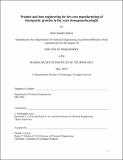Product and host engineering for low-cost manufacturing of therapeutic proteins in the yeast Komagataella phaffii
Author(s)
Dalvie, Neil Chandra
DownloadThesis PDF (22.92Mb)
Advisor
Love, J. Christopher
Terms of use
Metadata
Show full item recordAbstract
The COVID-19 pandemic revealed a global need for affordable, accessible biologic medicines such as prophylactic vaccines and monoclonal antibodies, particularly in low- and middle-income countries (LMICs). Therapeutic proteins, which can be stored as liquids, are more amenable to distribution in LMICs than newer modalities like therapeutic RNAs that require cryogenic storage. Currently, most therapeutic proteins are manufactured in either bacterial cell processes, which require bespoke purification processes to separate the product from cellular lysates, or in mammalian cell processes, which require long development timelines, stringent sterility requirements, and expensive feedstocks, all of which contribute to high costs.
Alternative hosts such as yeasts have potential to shorten development timelines, lower manufacturing costs, and increase global manufacturing capacity. Yeasts, like bacteria, grow to high cell densities on inexpensive feedstocks, and, like mammalian cells, can secrete of products into the extracellular space. One yeast, Komagataella phaffii (Pichia pastoris), is currently used for manufacturing of insulin and subunit vaccines in LMICs, and has been approved by the USFDA. Wider adoption of alternative hosts such as K. phaffii has been hampered by bespoke manufacturing challenges for unique therapeutic proteins such as subunit vaccines, and low upstream titers of complex therapeutic proteins such as monoclonal antibodies.
In this thesis, we explored two engineering strategies to improve the manufacturing of therapeutic proteins in K. phaffii. First, we engineered the product sequences of several subunit vaccine antigens and monoclonal antibodies to improve quality and secreted titer without sacrificing therapeutic function. Second, we developed tools for genome engineering in K. phaffii and applied these tools to engineer strains with improved secreted productivity. These engineered strains and product sequence modifications will enable rapid development of manufacturing processes for a wide range of therapeutic proteins.
Lastly, we applied product engineering and host strain engineering to enable low-cost manufacturing of a subunit vaccine candidate for COVID-19. Design of the drug substance for manufacturability enabled rapid technology transfer and scale up, and the vaccine candidate is currently in clinical trials. This success illustrates the immediate impact of manufacturing in K. phaffii in LMICs, where the need for therapeutic protein interventions is greatest.
Date issued
2022-05Department
Massachusetts Institute of Technology. Department of Chemical EngineeringPublisher
Massachusetts Institute of Technology